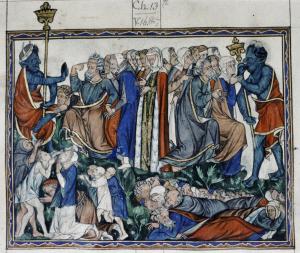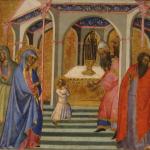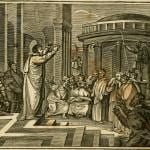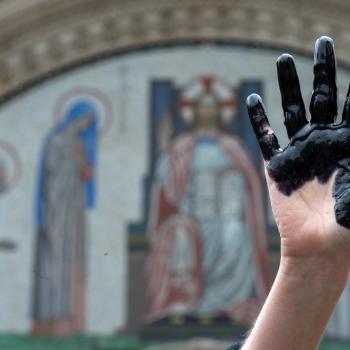
From time to time, a prophet would arise in Israel, decrying the sins of the people. Many of those sins, indeed, most of them, had social dimensions. The prophets gave stark warnings of what would come if the people did not repent. For, as with every action there is a reaction, the consequences of great social sin are dire. Sin causes harm to those who sin as the ramifications for sin are experienced. God, in his grace, held back those consequences, giving Israel a chance to repent and heal the damage which sin had caused the land. But when the people of Israel, especially its leaders (political and religious alike), continued to abandon the moral principles of the Torah, the prophets knew Israel would have to face the disaster which the people had created for themselves.
Sadly, the people of Israel did not want to hear the prophets. They wanted to believe everything was fine, and so when others, claiming to be prophets, said that God would protect Israel (and Jerusalem), because Israel (and Jerusalem) was loved by God, the people turned to those false prophets and heeded their assurances of peace and prosperity instead. Jeremiah, having none of it, said that such promises of peace did not come from God, and should not be believed:
“For from the least to the greatest of them, every one is greedy for unjust gain; and from prophet to priest, every one deals falsely. They have healed the wound of my people lightly, saying, `Peace, peace,’ when there is no peace. Were they ashamed when they committed abomination? No, they were not at all ashamed; they did not know how to blush. Therefore they shall fall among those who fall; at the time that I punish them, they shall be overthrown,” says the LORD (Jer. 6:13-15 RSV).
Jeremiah, speaking for YHWH, was clear: false prophets were deceiving the people of Israel:
Then I said: “Ah, Lord GOD, behold, the prophets say to them, `You shall not see the sword, nor shall you have famine, but I will give you assured peace in this place.'” And the LORD said to me: “The prophets are prophesying lies in my name; I did not send them, nor did I command them or speak to them. They are prophesying to you a lying vision, worthless divination, and the deceit of their own minds” (Jer.14:13-14 RSV).
Isaiah, likewise, saw how the people of Israel didn’t want to heed the warning of the oncoming judgment of God. All they wanted to hear were assurance that God would protect them as a result of the covenant he made with Moses at Sinai. The prophets who spoke for God told the people of Israel that their actions, their iniquity, would lead to grave consequences unless they repented. Instead of listening to the true prophets, the people listened to those who said what they wanted to hear, to those who told them they didn’t have to do anything to maintain God’s protection:
And now, go, write it before them on a tablet, and inscribe it in a book, that it may be for the time to come as a witness for ever. For they are a rebellious people, lying sons, sons who will not hear the instruction of the LORD; who say to the seers, “See not”; and to the prophets, “Prophesy not to us what is right; speak to us smooth things, prophesy illusions, leave the way, turn aside from the path, let us hear no more of the Holy One of Israel” (Is. 30:8-11 RSV).
It is very common for those who speak falsely for God to say that humanity doesn’t shape its own future, that whatever humanity does, God will overcome, so that there will be no need to fear the consequences of human perversity. But that is not how God acts. God does not stop humanity from its sins, nor does God stop humanity from facing the consequences of its sins if the people who commit them do not repent. Humanity can affect the world; those who promote the notion humanity can’t cause great harm and destruction to the environment around them have ignored the message of Scripture. In Genesis, it is clear, the earth itself suffers as the result of the fall of Adam. Likewise, human sin is said to have led to the great deluge as well as other environmental consequences. Scripture takes it for granted that sin is destructive, and like radiation, its contamination harms the world.
Those, then, who say God is in control and so will not allow the environment to be harmed offer the same false hopes that various false prophets offered the people of Israel. “Israel will not be destroyed.” “Jerusalem will be safe.” “The Temple will be protected.” All were false hopes. The same false hope can be seen when we hear people say, “Humanity cannot cause climate change.” Paul warned us to beware of such false promises, because they quickly lead to great distress: “When people say, ‘There is peace and security,’ then sudden destruction will come upon them as travail comes upon a woman with child, and there will be no escape” (1Thess. 5:3: RSV). Those who tell us we cannot truly harm the Earth, that whatever we do is of minor consequences, must ignore the truth revealed in the Apocalypse, where we are told judgment will come upon those who destroy the Earth (cf. Rev. 11:18). How can this be, if humanity cannot destroy the Earth?
We must realize that those who suggest it is impossible for humanity to cause great harm to the Earth are only issuing false-assurances. The warnings are there, just as in the time of Noah. Slowly, but surely, we see harsher weather patterns and the elimination of various important living species across the Earth. We must not ignore what lies before us, because just as with the people of Nineveh, there is the chance for us to repent and to heal the damage done to the Earth before it is too late.
Now, some people might say, a promise given go Noah indicates that God will no longer allow widespread harm across the Earth. But is that really what was indicated by the Genesis story? No:
And when the LORD smelled the pleasing odor, the LORD said in his heart, “I will never again curse the ground because of man, for the imagination of man’s heart is evil from his youth; neither will I ever again destroy every living creature as I have done. While the earth remains, seedtime and harvest, cold and heat, summer and winter, day and night, shall not cease” (Gen. 8:21-22 RSV).
Scripture only says God will not harm the Earth, not that humanity cannot do so. Moreover, Scripture in various places indicates the coming of the judgment of God over the whole of the Earth, a time of purifying fire and tribulation, which will not destroy the Earth but refine it as it is taken over into the eschaton (as the New Earth). For this reason, we should not follow false teachers who preach that it is impossible for humanity to affect the Earth, causing great harm to it. But we should not go to the other extreme and shrug off our duties, saying, “Well, the end of time will come, so why do we care?” This is because Christians are called to be stewards of the Earth; they are to take care of it and be concerned for its well-being. Thinking they can abandon their duty because they think the end has come (and they can help hasten that end) is like justifying murder by saying “well, the person would have died sooner than later, so I just thought I would take matters in my own hand and end their temporal existence by my own hand.”
Thus, we must remember, we are called to work with God in taking care of the Earth. When we forget this, or think it is of no consequence, we truly set the stage for great destruction, as Pope Benedict XVI understood:
If, in fact, man forgets in his work that he is a collaborator of God, he can do violence to creation and cause untold damage that always has negative consequences, also on human beings, as we have unfortunately seen on various occasions.[1]
This is exactly what so many have forgotten: we are called to work with God, and not just think God will take care of everything for them. This is what is wrong when people only offer “thoughts and prayers” for others if they can do more: it means they do not want to work with God. And because they do not work with God, they do not cooperate with grace; in their presumption, they cut off the grace needed to deal with the various crises they ask God to deal with, and so they will not get the aid they seek. We must work with God if we want the grace to be effective. God gives us room to act. God is not a genie granting wishes at the whims of humanity. Instead, God certainly gives great gifts to humanity, but he then trusts humanity to cooperate with him in the preservation and elevation of those gifts: Christians are supposed to render it all back to God in thanksgiving and praise instead of selfishly using and abusing them for own pleasure. God expects us to follow the moral guidelines and expectations he gave us, and this means, in regards the gift of the Earth, we are expected to take care of it, treasuring it as a wonderful gift of God:
The Earth is indeed a precious gift of the Creator who, in designing its intrinsic order, has given us guidelines that assist us as stewards of his creation. Precisely from within this framework, the Church considers that matters concerning the environment and its protection are intimately linked with integral human development.[2]
It is a gift to be rendered back to God, not a thing to be exploited;
Because creation was entrusted to human stewardship, the natural world is not just a resource to be exploited but also a reality to be respected and even reverenced as a gift and trust from God. It is the task of human beings to care for, preserve and cultivate the treasures of creation.[3]
Since we have failed to do this, it should be of no surprise that the Earth itself suffers, that it is being polluted, becoming dangerous for those living on it. And if we do not change our hearts, if we continue to presume its perseverance just because we see it is a gift given to us by God, we risk outright destruction. What happened to Israel, what happened to Jerusalem, can happen to the whole world. But there is hope. Even when we begin to experience widespread destruction, it does not mean it will be the end of the world, just as the Babylonian Captivity was not the end of the history of the people of Israel. There is still a chance for a return to things as they were before. We can change our ways. We can take on our responsibility to the world and seek to heal it from the damage which we have done.
St. John Paul II, understood what lies before us if we do not change our ways; we are coming closer and closer to facing the consequences of our inordinate activity in the world. Any nihilistic attitudes toward the Earth and its fate only lead to the abyss and the pain and suffering which comes from the abyss. It is not too late, but only if we have a true metanoia, a true change of heart, and convert ourselves to the pathos of God, to his care for his own creation. If not, our heart, running against God’s heart, will lead us to the abyss and the evil which flows from it:
We must therefore encourage and support the “ecological conversion” which in recent decades has made humanity more sensitive to the catastrophe to which it has been heading. Man is no longer the Creator’s “steward”, but an autonomous despot, who is finally beginning to understand that he must stop at the edge of the abyss.[4]
We still have hope. And amazingly enough, the false prophets did say something right: God does not abandon us. But that did not mean what they suggested it should mean. God is willing to help us help ourselves with his grace. We can begin to heal the Earth from all the harm which we have caused it. If we do not, we will face the dark consequences of our environmental sins. Though the time is short, we still have time. There is room for hope, but for that hope to be realized, we must come together and work out our salvation with much fear and trembling, a salvation which is material as well as spiritual:
The urgent challenge to protect our common home includes a concern to bring the whole human family together to seek a sustainable and integral development, for we know that things can change. The Creator does not abandon us; he never forsakes his loving plan or repents of having created us. Humanity still has the ability to work together in building our common home.[5]
Scientists and religious leaders alike recognize that we are facing a world-wide emergency. The world is suffering from human exploitation. Species are being destroyed. The environment is changing. If we do not do something soon, the effects will be widespread and long-lasting. The Earth is the Lord’s, not ours to abuse and exploit. It is not an infinite resource which we can use for our own pleasure. It is rather a gift of God; we must respect God by respecting the Earth. Those who say we need to do nothing, that the Earth will be fine no matter what we do, will only lead us to disaster if we heed their false predictions. We must change our ways. We must take seriously our stewardship of the Earth. We must recognize that now is the time for conversion. If we do not, we, not God, are responsible for what comes next.
[1] Pope Benedict XVI, Address of Pope Benedict XVI to Students Participating in a Meeting Promoted by the “Sister Nature” Foundation (11-28-2011). Vatican translation.
[2] Pope Benedict XVI, “Video Statement of Pope Benedict XVI to the UN 2009 Summit on Climate Change,” Vatican translation.
[3] St. John Paul II, Ecclesia in Oceania. Vatican translation. ¶31.
[4] St. John Paul II, General Audience (01-17-2001) Vatican translation. ¶4.
[5] Pope Francis, Laudato si’. Vatican translation. ¶13.
Stay in touch! Like A Little Bit of Nothing on Facebook.
If you liked what you read, please consider sharing it with your friends and family!













